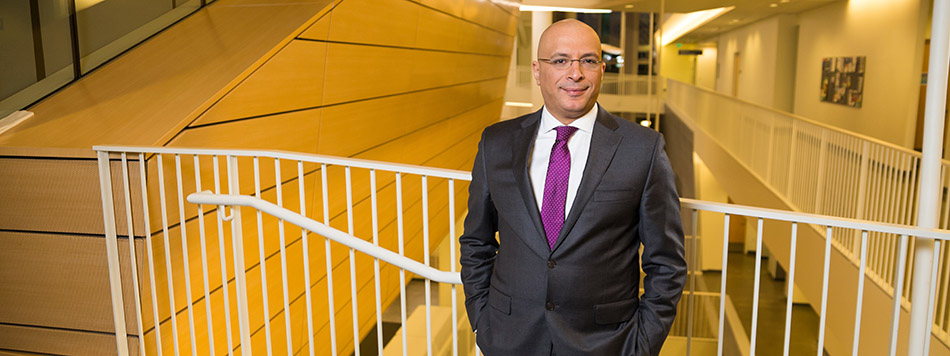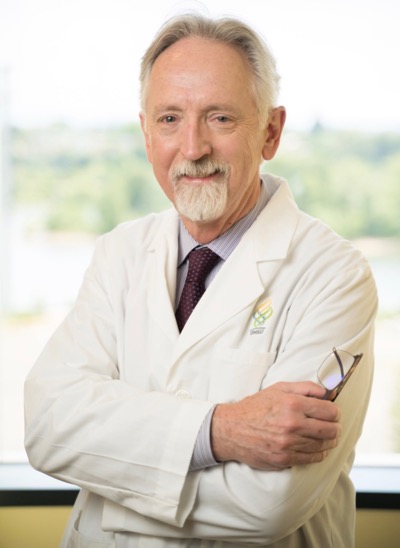Neurosurgery for Pain

Patients travel from around the world for our advanced surgical options to treat chronic (ongoing) nerve pain. We offer procedures that aren’t available anywhere else.
You’ll find:
- Advanced options, such as techniques pioneered at OHSU to treat trigeminal neuralgia, a type of searing facial pain.
- Internationally recognized neurosurgeons who treat patients, pursue discoveries in the lab and publish widely.
- The neurosurgeon who served as the editor and principal author of the textbook, “Surgical Management of Pain,” considered the definitive text of pain surgery.
- Team-based care, with surgeons, physician associates and nurses working together.
- A focus on less-invasive options before we consider surgery.
- Clinical trials, to test promising treatments for pain.
Conditions we treat
Chronic nerve conditions, lasting six months or longer, that we can treat with surgery include:
- Cancer-related nerve pain
- Complex regional pain syndrome (chronic pain, most often in a limb and usually after an injury)
- Facial pain (such as trigeminal neuralgia, resulting from pressure on the trigeminal nerve)
- Failed back syndrome (spine pain after surgery)
- Neuropathic pain (pain from damage to nerve fibers, usually from injury)
- Occipital neuralgia (pain from inflamed or injured nerves linking the spinal cord and scalp)
- Peripheral neuropathy (pain in nerves outside the brain and spinal cord, most commonly caused by diabetes)
Our approach to neurosurgery for pain
We start with a thorough assessment to diagnose your condition, then we treat any underlying condition first. We consider surgery only if lifestyle changes or less-invasive options haven’t helped.

Our excellence
- Our team includes Dr. Kim Burchiel, an internationally recognized neurosurgeon. He is the author of dozens of research papers as well as a highly regarded textbook, “Surgical Management of Pain.” He has innovated ways to classify, diagnose and treat trigeminal neuralgia (facial pain). In addition, he is leading an international study, among other research, to find the genes that cause trigeminal neuralgia.
- Our team also includes Dr. Ahmed Raslan, a neurosurgeon with extensive advanced training and dozens of published research papers. Dr. Raslan, in addition to his focus on treating nerve pain, was the first surgeon in Oregon to use robotic surgery to treat epilepsy. He is also a contributor to “Surgical Management of Pain.”
- If needed, our doctors collaborate with specialists across OHSU, including in the Comprehensive Pain Center, the Spine Center and the Knight Cancer Institute.
- Patients at the OHSU Brain Institute may be eligible to take part in a wide range of clinical trials. Trials give patients a chance to try a new therapy while helping researchers find ways to improve care.
Types of neurosurgery for pain
Your surgeon will work with you to decide which surgery best suits your needs. Types of neurosurgery to treat pain include:
- Ablation surgery, which uses heat or another method to remove or destroy a small area of nerve tissue to disrupt pain signals.
- Cordotomy for severe cancer pain, in which your surgeon uses an image-guided needle to disable a section of nerves in your spine.
- Decompression surgery to remove pressure on nerves that are causing pain.
- Neuromodulation, which use medication or mild electrical stimulation to relieve pain. This could include an implanted pump to deliver medication, or a small implanted device that uses electric pulses to block pain signals. It includes spinal cord stimulation, available at OHSU.
We also offer a range of facial pain surgeries, including decompression and neuromodulation options.
Our team
Neurosurgeons
-
- Kim J. Burchiel, M.D., F.A.C.S.
- Accepting new patients
-
- Adam Benjamin Lipson, M.D. (he/him)
- Accepting new patients
-
- Ahmed M. Raslan, M.D., FAANS
- Accepting new patients
-
- Josha Woodward, M.D., M.C.R. (he/him)
- Accepting new patients
Advanced practice providers
-
- Shea M. DeKlotz, PA-C (she/her)
- Accepting new patients
For patients
Referral: To become a patient, please ask your doctor for a referral.
Questions: For questions or follow-up appointments, call 503-494-4314.
Refer a patient
- Refer your patient to OHSU.
- Call 503-494-4567 to seek provider-to-provider advice.